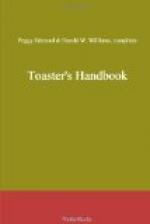“No, sirree!” ejaculated Bunkerton. “There wasn’t any of that nonsense in my family. My father never thrashed me in all his life.”
“Too bad, too bad,” sighed Hickenlooper. “Another wreck due to a misplaced switch.”
James the Second, when Duke of York, made a visit to Milton, the poet, and asked him among other things, if he did not think the loss of his sight a judgment upon him for what he had writen against his father, Charles the First. Milton answered: “If your Highness think my loss of sight a judgment upon me, what do you think of your father’s losing his head.”—Life.
A white man during reconstruction times was arraigned before a colored justice of the peace for killing a man and stealing his mule. It was in Arkansas, near the Texas border, and there was some rivalry between the states, but the colored justice tried to preserve an impartial frame of mind.
“We’s got two kinds ob law in dis yer co’t,” he said: “Texas law an’ Arkansas law. Which will you hab?”
The prisoner thought a minute and then guessed that he would take the Arkansas law.
“Den I discharge you fo’ stealin’ de mule, an’ hang you fo’ killin’ de man.”
“Hold on a minute, Judge,” said the prisoner. “Better make that Texas law.”
“All right. Den I fin’ you fo’ killin’ de man, an’ hang you fo’ stealin’ de mule.”
A lawyer was defending a man accused of housebreaking, and said to the court:
“Your Honor, I submit that my client did not break into the house at all. He found the parlor window open and merely inserted his right arm and removed a few trifling articles. Now, my client’s arm is not himself, and I fail to see how you can punish the whole individual for an offense committed by only one of his limbs.”
“That argument,” said the judge, “is very well put. Following it logically, I sentence the defendant’s arm to one year’s imprisonment. He can accompany it or not, as he chooses.”
The defendant smiled, and with his lawyer’s assistance unscrewed his cork arm, and, leaving it in the dock, walked out.
Muriel, a five-year-old subject of King George, has been thought by her parents too young to feel the weight of the rod, and has been ruled by moral suasion alone. But when, the other day, she achieved disobedience three times in five minutes, more vigorous measures were called for, and her mother took an ivory paper-knife from the table and struck her smartly across her little bare legs. Muriel looked astounded. Her mother explained the reason for the blow. Muriel thought deeply for a moment. Then, turning toward the door with a grave and disapproving countenance, she announced in her clear little English voice:
“I’m going up-stairs to tell God about that paper-knife. And then I shall tell Jesus. And if that doesn’t do, I shall put flannel on my legs!”
During the reconstruction days of Virginia, a negro was convicted of murdering his wife and sentenced to be hanged. On the morning of the execution he mounted the scaffold with reasonable calmness. Just before the noose was to be placed around his neck the sheriff asked him if he had anything to say. He studied a moment and said:




